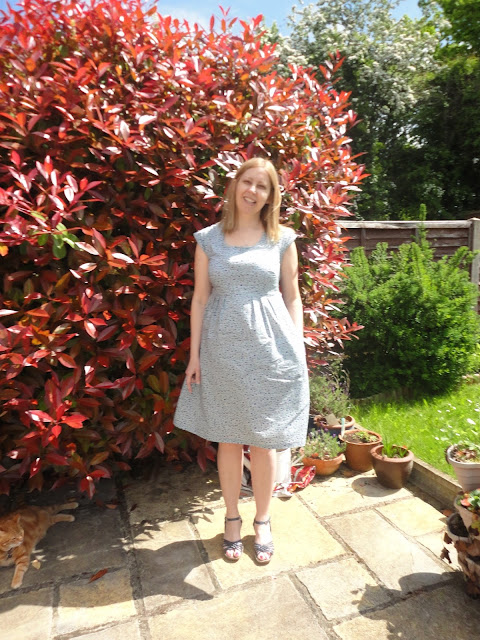What a lovely sunny day and as promised, here is my latest make, the Washi dress by
Made by Rae.
 |
| Can you see Oscar? |
I coerced my daughter into taking the photos. As you can see,my cat was keen to get into the photos.
I made this using some cotton that I bought at the Knitting and Stitching Show at Olympia, that I posted about
here. The fabric came from
Simply Fabrics and was very reasonably priced, about £5 a metre if I remember rightly.
The Washi dress is a simple make, and perfect for beginner dressmakers.
 |
| Washi dress by Made by Rae |
I fell in love with it after seeing it on
pinterest. It features a cut-out scoop neckline, although I decided to omit this as I felt it might be a bit low cut for everyday life. It features a pleated front and a shirred back. It also has built in pockets. It can be made with or without sleeves and also can be adapted as a tunic or maxi dress. It's a fairly expensive pattern to download at $16 dollars (roughly £10) but I figured this would be a dress that I could make again and again.
There is also a Washi dress
expansion pack which can be purchased if you want to add further looks.
 |
| Washi dress expansion pack by Made by Rae |
I also found that there is a free tutorial and pattern piece for long sleeves that can be downloaded
here, so there are lots of options for this dress.
Based on my high bust measurement, I decided to make a size M. In the instructions, Rae recommends making a muslin of the bodice. I did this for the first time ever using an old pillow case and was very glad as it was clear I needed a full bust adjustment (FBA). I followed the tutorial that can be found on
Simplicity's website for increasing the size of a dart. I did a one inch FBA. I also lowered the bust dart by adding an inch below the armhole.
Remember any changes you make to the bodice pattern piece, you have to also make the back pattern piece!
This lengthened the bodice and on making my second pillow case muslin, I decided I had a good fit and could cut in to my material!
The dress was fairly easy to construct and the instructions are very detailed and clear. They are also fully illustrated with either drawings or photos. The darts are french darts which I'd not come across before. The other unusual thing is that the seam allowances are either 1/4 inch at the armhole and neckline or 1/2 inch at the side and shoulder seams instead of the usual 5/8 inches.
The skirt is pleated and then sewn to the front bodice.
The back bodice is then shirred. I hand winded the shirring elastic bobbin and then sewed in straight rows using the normal thread in the needle, pulling the material straight as I sewed across after the first row. Rae gives a lot of information about how to shirr with elastic thread and if it's the first time you've done it like me, you will find this very useful.
The dress is faced at the neckline and then once the sleeves are attached, bias binding is applied at the armholes. I decided to stitch mine on the outside as my hand-sewing is not great, I made my own bias binding using the same fabric and I'm pretty pleased with the results. I had to give it a real blast of steam to get a few wrinkles out though.
Finally I machine hemmed the dress. I didn't change the length of the dress as I liked it as it was.
I'm sure I will make dress again! I might leave out the pockets as I think the skirt would sit better without them. There is a tiny back neckline gape that I could fix but it's really not that noticeable.
I also think I need to invest in a tailor's ham for pressing those bust darts.
Have you made the Washi dress yet and do you love it too?
Catherine x




















